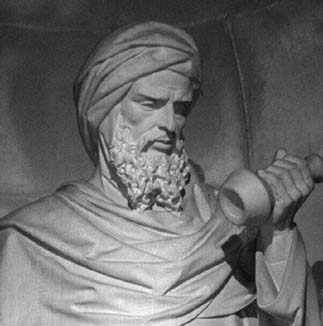by Blake Armas
Abu al-Walid Muhammad ibn Rushd, or Averroes as he is called in the West, was born in 1126 in Cordoba, Spain, and died in 1198 in Marrakech under the Almohad Empire (currently Morocco). Ibn Rushd is most renowned for his contributions to philosophy which fused Islamic traditions with Greek thought. He is also famously known for his commentaries on the works of Aristotle and Plato’s republic.
Ibn Rushd was fortunately born into a well respected family in the legal and public service sector. His grandfather, Abdul-Walid Muhammad (d.1126), was an influential chief judge of Cordoba during the Almoravid Dynasty, who specialized in legal methodology. His father, Abdul-Qasim Ahmad, was also a chief judge specializing in legal methodology, until the Almoravids were overtaken by the Almohad Dynasty in 1146 (Hillier 2017).
 He received a rather traditional education, studying subjects such as hadith, linguistics, jurisprudence, and scholastic theory. Although the early Muslim bibliographers did not heavily focus on his scientific and philosophical education, those in the west were extremely interested. It is believed that he received his education from prominent figures in each field. For example, bibliographers and historians believe he was once tutored in philosophy by Ibn Bajjah (Avempace), and had his medical education directed by Abu Jafar ibn Harun of Trujillo. Even though he is most known for his contributions to philosophy, he was also well versed in medicine, and can be referenced in Abu Marwan Ibn Ruhr's books, Kitab al-Kulyat fi al-Tibb (Generalities), and Kitab al-Taisir fi al-Mudawat wa al-Tadbir (Particularities), which were the primary medical texts for Jewish, Christian, and Muslim physicians (Hillier 2017).
He received a rather traditional education, studying subjects such as hadith, linguistics, jurisprudence, and scholastic theory. Although the early Muslim bibliographers did not heavily focus on his scientific and philosophical education, those in the west were extremely interested. It is believed that he received his education from prominent figures in each field. For example, bibliographers and historians believe he was once tutored in philosophy by Ibn Bajjah (Avempace), and had his medical education directed by Abu Jafar ibn Harun of Trujillo. Even though he is most known for his contributions to philosophy, he was also well versed in medicine, and can be referenced in Abu Marwan Ibn Ruhr's books, Kitab al-Kulyat fi al-Tibb (Generalities), and Kitab al-Taisir fi al-Mudawat wa al-Tadbir (Particularities), which were the primary medical texts for Jewish, Christian, and Muslim physicians (Hillier 2017).
Under Caliph ‘Abd al-Mu’min in Marrakesh (present-day Morocco), Ibn Rushd was most likely involved in the educational reform that took place. Working and being involved with such projects under the Almohad Dynasty, significant influenced his work. While living in Marrakesh between 1159 and 1169, Ibn Rushd befriended Ibn Tufayl (Abubacer), a philosopher, official physician, and counselor, to Caliph Abu Yaqui Yusuf, the son of ‘Abd al Mu’min. He was then introduced to the prince, who employed him as the chief judge in Seville, and a chief physician in Marrakesh (Pasnau 2011). Abu Yaqub Yusuf then commissioned him to write a series of commentaries on Aristotle’s texts, because he had trouble understanding the Greek philosophy. Because of this, Ibn Rushd owes his legacy as a commentator of Aristotle to Abu Yuqub Yusuf (Hillier 2017).
These commentaries steered the Almohads towards a more liberal way of thinking, which prompted them to formally abandon the previously accepted Ibn Tumart’s theology, and accept Malikite law in 1229. However, the liberalization within the government ignited the negative public pressure towards Ibn Rushd, which led to the formal rejection/burning of his writings, and subsequent exile to the Jewish village of Lucena (outside Cordoba) in 1195. This exile was due to the Caliph’s desire to conserve religious figures, which did not fall in line with his ideology (Pasnau 2011). Two years later, he returned to Marrakesh where the Caliph was able to restore his position, but he died the next year in 1198. Even after his death, Islamic philosophers questioned his level of orthodoxy, but those of Christian and Jewish traditions found his writings of great interest (Hillier 2017).
Most of his philosophical career was spent on the commentaries of Aristotle’s writings, “producing both brief epitomes and exhaustive, line-by-line studies” (Pasnau 2011, para. 5). According to Pasnau (2011), Ibn Rushd’s controversial career is so intriguing due to the little influence he had on the Islamic world, despite his extraordinary success and brilliance in the West. Many of his writings do not exist in Arabic, but are preserved in the Latin and Hebrew translations.

His philosophies were considered to be quite controversial at the time, because of his tendencies to fuse philosophy and religion, under the belief that logic was the key to a true understanding of religion. In Robert Pasnau’s article, The Islamic Scholar Who Gave Us Modern Philosophy, he outlines three reasons why Ibn Rushd was in a league of his own. First, he believed that both the Quran and philosophy support the notion that the world as always existed in some sort, and although God had the power to shape nature and the physical world, it has still always existed along with God himself. Second, he believed that our souls live after death, but our bodies do not, and cannot be resurrected. According to his philosophy, our souls can acquire new bodies in the next life, but they will never be the same as the ones we have now. He also denied the Quran’s mention of a garden of delights awaiting us after death. Third, he denied the idea that humans possess their own intellect. According to him, intellect is separate from souls, and is something we all share and can gain access to when we think (Pasnau, 2011).
All three of those points were considered to be extremely heretical by others, but he believed they fell in line with and were supported by religious teachings, and could be studied through the lens of Aristotle’s philosophy. Philosophy was extremely important to Ibn Rushd, and he communicated that through one of his most famous works, the Decisive Treatise, which argued in favor of the value of philosophy, and its necessity for a true understanding of religion.
Ibn Rushd also countered the writings of the renowned Abu Hamid al-Ghaali, who supported the notion that Muslims should adopt Sufi-influenced education programs of spiritual purification. Ibn Rushd argues that there can be no conflict between philosophy and faith, however he accepts that not everyone is meant to pursue the answers to such philosophical religious questions (Pasnau 2011). Following the example of al-Ghazali, Ibn Rushd enforced the differentiation between “the people of rhetoric” and “the people of “demonstration”. The majority of Muslims, the people of rhetoric, are meant to accept the teachings of the Quran at face value, while the people of demonstration are those who are well equipped to tackle and interpret the deep philosophical questions. The questioning and philosophical interpretation of the Quran is what Pasnau relates Ibn Rushd’s marginal success within Islamic philosophy to.

Despite the unfavorable tone towards Ibn Rushd in the Islamic World, western interests from the newly established universities in Europe were very fond of his writings, because the philosophy taught was primarily that of Aristotle; and Ibn Rushd’s commentaries proved to be extremely helpful for interpretation. These institutions were also far more secular than those in the Islamic World, making them much more open to the “religion infused with philosophical thought” ideology. He became so popular that his commentaries were often preferred over those of the Christian tradition, and were even studied alongside Aristotle’s. (Pasnau 2011; Robinson 2016).
After his death, Ibn Rushd’s legacy was able to reach the new heights and extraordinary success in Europe that he was never able to experience in his homeland. Even so, he has still gone down in history as one of the last great Islamic philosophers. However, in the west, Ibn Rushd will always be remembered as a great philosophical mind that was able to further communicate Aristotle’s “vision of a religion grounded in rigorous philosophical thinking” (Pasnau 2011, para. 15), which changed the course of European academics forever.
References
Hillier, Chad H. 2017. Ibn Rushd (Averroes). Internet Encyclopedia of Philosophy.
Pasnau, Robert, November/December 2011. The Islamic Scholar Who Gave Us Modern Philosophy. Humanities The Magazine of the National Endowment for the Humanities. Vol. 32, No. 6.
Robinson, Chase F 2016. Islamic Civilization in Thirty Lives the First 1,000 Years. pp. 169-177. University of California Press. Oakland, CA.
Links to Photos


No comments:
Post a Comment